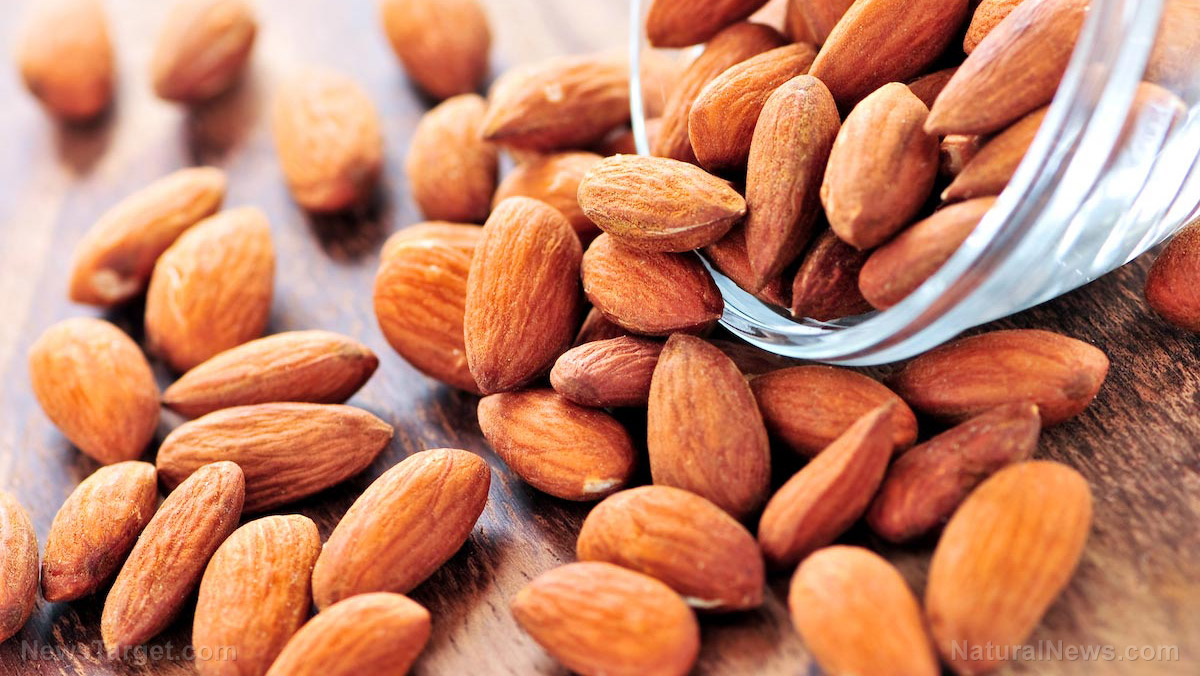Here’s why you should start snacking on almonds every day
05/15/2018 / By Zoey Sky

Like other nuts, almonds are the perfect energy boosters. Almonds are nutritious, and they contain at least 130 different compounds that are good for you.
The health benefits of almonds
Almonds contain both mono- and polyunsaturated fat, but these are the “good” kinds of fats that can boost your heart health. Below are the nutrition stats for a cup of sliced almonds:
- 533 calories
- 20 grams (g) carbohydrates (seven percent daily value [DV])
- 12 g dietary fiber (48 percent DV)
- 19 g protein (38 percent DV)
- 46 g total fat (71 percent [DV]) – 3.5 g saturated fat (17 percent DV), 29 g monounsaturated fatty acids, and 11.2 g polyunsaturated fatty acids
- 50 milligrams (mg) choline
- 3.41 mg iron (19 percent DV)
- 15 mg phosphorus (44 percent DV)
- 167 mg potassium (14 percent DV)
- 248 mg magnesium (62 percent DV)
- 23.58 mg vitamin E (79 percent DV)
- 2.8 mg zinc (19 percent DV)
A popular superfood, almonds contain antioxidants, minerals, phytochemicals, vegetable proteins, and vitamins. Additionally, almonds contain polyphenols (a chemical compound) that have an antioxidant effect and helps improve cholesterol. The nuts can also lower your risk of developing heart disease.
If you have diabetes, add almonds to your diet because they can help improve your blood sugar control or glycemic status. (Related: Eating 15 almonds a day lowers bad cholesterol levels and decreases the risk for diabetes.)
According to some studies, consuming almonds regularly can also help improve cognitive function. Almonds can also provide a prebiotic effect that benefits gut microbiota since the nuts contain dietary fiber and polyphenols.
Even though almonds are like other healthy nuts, they’re a better choice because they contain less fat compared to hazelnuts, macadamia nuts, pistachios, and walnuts.
Almond milk is also a good milk substitute, especially if you’re lactose intolerant, vegan, or you want to avoid dairy. Before you purchase anything, check if you’re buying organic almond milk because “plain almond milk” could still contain added sugar, such as 18 g per eight-ounce (oz) cup.
When buying almond milk, always get the unsweetened kind. Check the labels for sodium content because flavored almond milk can contain at least 230 mg of sodium. Another option is to make your own almond milk.
If you’re looking for a healthy peanut butter alternative, try some almond butter. The latter has the same nutrient content as the former. Two-tablespoon servings of both almond butter and peanut butter contain at least 200 calories, 17 grams of fat, and four grams of fiber.
Almond butter is also rich in vitamin E. Additionally, almond butter contains a bit more calcium, potassium, and magnesium than peanut butter. When buying almond butter, choose unsweetened butters without additives.
Another nut-based product is almond flour, which is perfect for individuals with celiac disease or gluten sensitivity. Almond flour is made from blanched and ground almonds and it contains more protein than other grain-free flours.
Use almond flour as an alternative to traditional wheat flour since it contains less saturated fat than coconut flour. You can even get 15 percent of your daily value of vitamin E from only two tablespoons of almond flour!
Now that you know about these healthy almond-based products, try some of them today so you can enjoy the various health benefits that they offer.
Fast facts on almonds
- Almonds thrive in “really hot weather and cool winters.”
- Almonds rely on wild bees and honey bees for crop pollination. Almond growers often rent bees for pollination, and it’s usually a financial concern for growers.
- Immature green almonds can be preserved and pickled, and it’s considered a delicacy in some areas.
- There are eight major varieties of almonds, and even though they all have the same nutritional profile, the Nonpareil is highly valued among growers.
- Almonds can help slow down the absorption of sugar and carbohydrates.
You can read more articles about fresh food and the benefits of eating organic almonds and almond products at Fresh.news.
Sources include:
Tagged Under: almond butter, almond flour, Almond Milk, almonds, almonds benefits, eat healthy, energy-boosters, fresh foods, good food, health compounds, healthy diet, heart health, monounsaturated fats, natural remedies, nutrients, polyunsaturated fats, proper diet, proper nutrition, Proteins, raw food, super snack, vitamin E



















